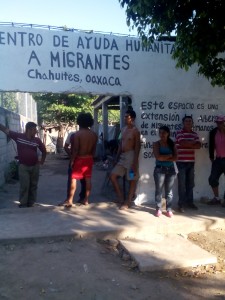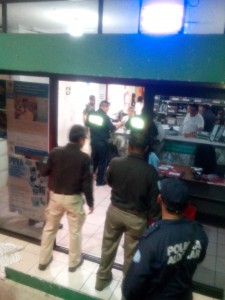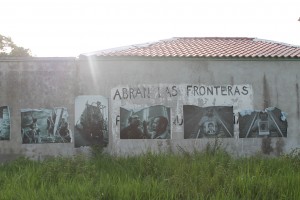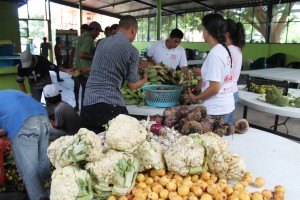 Adrián Rodríguez Garcia and Wilson Castro, who provided food and other aid to migrants in Mexico State were shot to death in their pick-up truck on Nov. 23. The news came as a devastating blow to the human rights community in Mexico. A criminal gang that Rodríguez and Castro had denounced for its assaults on migrants in the town of Tequixquiac, north of Mexico City, fired a round of bullets into the truck, parked outside the home of Rodríguez’s parents. Rodríguez died instantly, and Castro died in the hospital in the early hours of the 24th.
Adrián Rodríguez Garcia and Wilson Castro, who provided food and other aid to migrants in Mexico State were shot to death in their pick-up truck on Nov. 23. The news came as a devastating blow to the human rights community in Mexico. A criminal gang that Rodríguez and Castro had denounced for its assaults on migrants in the town of Tequixquiac, north of Mexico City, fired a round of bullets into the truck, parked outside the home of Rodríguez’s parents. Rodríguez died instantly, and Castro died in the hospital in the early hours of the 24th.
These violent deaths call attention to the risks human rights defenders face in Mexico, especially those who work with Central American migrants. Many of these risks come from Immigration agents themselves. Human rights organizations report that Mexican authorities routinely impede their work. Migrant rights defenders have become more vocal in demanding fair and legal treatment of migrants in Mexico, yet in recent months they have suffered physical attacks, law suits and arbitrarily been prevented from providing legal aid to migrants.
The Plan Frontera Sur, or Southern Border Plan, has further militarized immigration enforcement in southern Mexico and endangered Central American trans-migrants. In response, migrants rights defenders have adopted new strategies, including documenting violations in Immigration enforcement, and directly challenging illegal or unjust detention practices. The National Immigration Institute (INM for its initials in Spanish) has repeatedly victimized Mexicans and foreigners who work with migrants in the states of Oaxaca and Tabasco, leaving unresolved the contradictions in immigration enforcement, and the pervasive corruption of Immigration officials. Activists question whether the actions against them are retaliation on the part of Immigration officials.
“The law versus praxis”
The Mexican Immigration Law, reformed in 2011, is innovative in many respects and extends broad protections to migrants in the country, including the many Central Americans who traverse Mexico on their way to the United States, referred to as “trans-migrants.” But INM officials systematically violate the letter of the law, and migrants often do not get the protection they are legally entitled to.
Wilson Alexi Stothard, born in Honduras and now a Mexican resident, works at the migrant shelter Hermanos en el Camino (Brothers in the Journey) in Ixtepec, Oaxaca. In an interview with the Americas Program, he described the situation as, “the law versus praxis”. Migrant rights defenders have worked to fill these gaps where the state has failed to make rights a reality.
The Ixtepec shelter provides legal aid to migrants and physical shelter while they complete their regularization process. The 2011 Migration Law affirms the right of migrants in Mexico who are victims of crimes to receive a humanitarian visa to stay in the country. However, this process takes several months, as the plaintiff has to make repeated trips to a central Immigration office to sign paperwork and make declarations. The shelter has the capacity to house Central Americans who are pursuing either a work visa or a humanitarian visa.
Stothard received a humanitarian visa after being a victim of a violent assault in Oaxaca. He says, “While we have the right to the visa if we’re victims, Immigration is trying to let the fewest number possible of foreigners get papers in Mexico.”
Critics of Plan Frontera Sur are its latest victims
The Southern Border Plan, which was announced in July by Mexican President Enrique Peña Nieto and entered into force in August, seeks to reduce the flow of migrants reaching the U.S./Mexico border. The Plan will receive $86 million from the U.S. through the Merida Initiative. The Plan is framed in the language of protecting migrants, yet those who work directly with Central American migrants have harshly criticized the strategy because it puts migrants at greater risk. It immediately increased the number of Immigration agents on “La Bestia” to detain migrants, a tactic which had largely been phased out due to organizing by human rights groups. To avoid the raids and deportation, migrants sometimes jump off the train, leading to injury or death.
The Plan Frontera Sur also calls to increase the speed of the train to discourage migrants from boarding. “It’s ignorant to think that modernizing the train will solve the problem of migration” says friar Tomás González Castillo of the Tenosique, Tabasco migrant shelter. “The Bestia is transportation that the migrants are obligated to use.”
A group of migrant rights defenders associated with the Hermanos en el Camino shelter, several of them Central American, took on the task of documenting the activities of Immigration officials along the train route. Armed with video cameras and cell phones, they boarded the Bestia in Ixtepec on Sept. 18, with the intention of arriving in Medias Aguas, Veracruz. However near the town of Chivela, Oaxaca, the four activists were attacked by INM officials and had their video equipment confiscated with no justification.
 From the initiation of Plan Frontera Sur in August to the incident in Chivela in September, Hermanos en el Camino had already documented 57 crimes against migrants arriving at the shelter, described by a coordinator as a 90% increase.
From the initiation of Plan Frontera Sur in August to the incident in Chivela in September, Hermanos en el Camino had already documented 57 crimes against migrants arriving at the shelter, described by a coordinator as a 90% increase.
Responding to these necessities, a new shelter has opened in Chahuites, Oaxaca, the point where many migrants are now boarding the train because they can no longer board in Arriaga, Chiapas. Stothart has also worked in Chahuites providing direct humanitarian aid and says that the migrants arriving there have had to walk for several days through remote areas where members of organized crime, “are waiting to assault them and leave them there.” He notes many women are victims of rape along the way and that all this unfolds, “under the detection (radar?) of the government and the press.” they know or they don’t know?
INM criminalizes humanitarian work
On November 5th, the shelter in Tenosique, Tabasco, the point of entry for the northern or “Gulf” route through Mexico, denounced actions by the INM to defame friar Tomás González Castillo, founder and director of the shelter. The communiqué states that an INM official named Marvin Agustín Tapia Nava has charged that, “on Sept. 29 of this year, ‘as he cordially greeted friar Tomás González, who was in his pick-up, González grabbed his hand and revved up the pick-up, dragging him for more than 100 meters and causing serious injuries.’”
In a visit in July to the Tenosique shelter, The Americas Program observed a well-organized and motivated group of volunteers coordinated by Gonzalez Castillo, who was civil with the local police who monitor the shelter. The Nov. 5 communiqué continues to say, “This charge is highly improbable and false and is part of the alarming increase in the persecution and violent criminalization for the part of the INM against the migrants at the shelter and those of us who provide humanitarian aid [in the shelter].” The communiqué lists five incidents during 2014 in which INM officials violated the human rights of either migrants or humanitarian workers.
Later in November, a bizarre incident unfolded in Tapanatepec, Oaxaca, in which Mexican and Central American activists directly encountered the selective application of the Immigration Law and Immigration officials directly impeded their legal humanitarian work. Stothard, Ixtepec shelter coordinator Jessica Cardenas and Chahuites coordinator Irineo Mujica Arzate were accompanying a group of ten Central American migrants to the Salina Cruz Immigration offices. All of the migrants had arrived in the shelter in Chahuites and had been victims of different crimes since crossing into Mexico. They had already denounced the crimes at the Immigration check-point in Tapanatepec, close to Chahuites. However, to continue the process they had to go to Salina Cruz, one of the two offices in the state authorized to emit visas. To reach Salina Cruz, they had to travel through an area heavily monitored by Immigration agents.
Even though the group had the paperwork necessary to prove their legal situation in Mexico and pass Immigration check points, Stothard, Cardenas and Mujica Arzate decided to accompany them. Stothard explains, “They had everything the law says they need to present their case. But we went with them, because we already know how the Immigration authorities operate.”
 This decision proved prescient, as the bus was stopped in Tapanatepec and Immigration officials demanded to see their papers. Shothard, Cardenas and Mujica Arzate refused to let the Immigration officials take the group of migrants off the bus. While Stothard filmed, Cardenas and Mujica Arzate explained in detail to the officials the legal process that was already underway and showed the paperwork as evidence.
This decision proved prescient, as the bus was stopped in Tapanatepec and Immigration officials demanded to see their papers. Shothard, Cardenas and Mujica Arzate refused to let the Immigration officials take the group of migrants off the bus. While Stothard filmed, Cardenas and Mujica Arzate explained in detail to the officials the legal process that was already underway and showed the paperwork as evidence.
The Immigration officials refused to budge, and neither did the activists. They physically prevented the officials from taking the migrants off the bus, and the officials refused to let the bus through as long as the migrants were aboard, although they had presented all the required paperwork. However, they allowed the rest of the passengers to get off the bus and Stothard says, “The driver got off the bus and left it abandoned there.” Only the migrants, the activists and INM remained.
Twelve hours later they were able to reach an agreement, but not before the activists had publicized the case on social media. Stothard says, “They are afraid now, because they know we are filming everything, and they can’t get away with it.” Ultimately, Immigration transported the group of Central Americans to Ixtepec where they will continue their legal process, and no one was detained for deportation. They agreed to expand the legal services available to migrants in Tapanatepec so that they do not have to travel to Salina Cruz for all services.
Exposing duplicity in INM
The common thread between the incidents in Chivela, Tenosique and Tapanatepec is the intimidation of human rights defenders who have exposed irregularities and human rights violations by INM officials. These incidents are particularly concerning considering that some of the actors involved, including friar Tomás, have been granted protective measures by the federal program to ensure their physical safety.. Others, such as Stothard and Guatemalan Gonzalo González, who was in Chivela, are legal residents of Mexico on humanitarian visas.
The protection of trans-migrants in Mexico, included in both the Mexican Immigration Law and the Plan Frontera Sur, was a primary concern for the activists in Chahuites. Stothard explains that the shelter in Chahuites does not have adequate security, and considering m any migrants have been victims of crimes nearby, staying there is means being in “the belly of the beast.” In Ixtepec, they have closer access to the Immigration offices and better security. However, Immigration officials acted explicitly against the best interests of the group of trans-migrants, who carried with them the necessary documentation to travel to Ixtepec. The activists criticized the language of rights and protection in the Immigration law as lip service that ultimately masks a policy of detention and deportation.
any migrants have been victims of crimes nearby, staying there is means being in “the belly of the beast.” In Ixtepec, they have closer access to the Immigration offices and better security. However, Immigration officials acted explicitly against the best interests of the group of trans-migrants, who carried with them the necessary documentation to travel to Ixtepec. The activists criticized the language of rights and protection in the Immigration law as lip service that ultimately masks a policy of detention and deportation.
Activists are rapidly developing strategies to respond to the new realities of immigration enforcement under the Plan Frontera Sur. Stothard says the confrontation in Tapanatepec, “wasn’t anything planned, but there we were, and we couldn’t back down.” He adds, “The state and its officials, and organized crime, work against the interests of migrants.”
But as recent actions show, trans-migrants in Mexico have strong defenders in civil society who are not afraid to expose the corruption and contradictions of Immigration enforcement.



